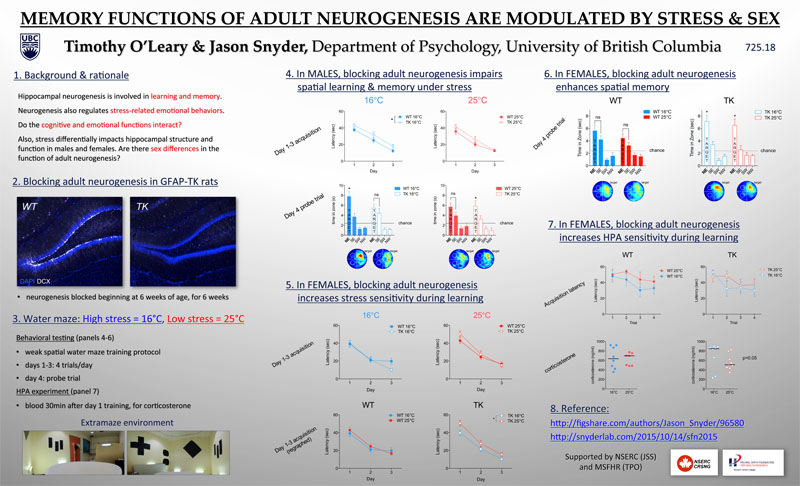 Wednesday, Oct 21, 2015, 8:00 AM -12:00 PM, 725.18/BB27.
Wednesday, Oct 21, 2015, 8:00 AM -12:00 PM, 725.18/BB27.
Here is our poster for the 2015 Society for Neuroscience annual meeting. I will be presenting but Tim O’Leary did all the work. Actually, I did a bit of work, but Tim did most of the work.
Briefly, this project came about for a few reasons. First, there has been evidence that adult hippocampal neurogenesis is important for classic hippocampal spatial processing, but the literature are far from consistent. So if there is a role there must be certain conditions that determine when neurogenesis is involved. What are those darned conditions?! Second, more and more studies are finding that adult neurogenesis is important for emotional behavior, and that these functions are often more apparent when a mouse or a rat (that lacks neurogenesis) is being, or has been, stressed. We therefore wanted to see if increased stress at the time of learning could reveal differences between normal rats and transgenic rats that have no adult neurogenesis.
So we trained rats in the spatial water maze at two different temperatures: 16ºC (high stress) and 25ºC (low, or at least lower, stress). We expected that blocking neurogenesis would impair learning and memory in the 16ºC condition. Instead, we found that neurogenesis-deficient rats were often doing better than wild types. But these weren’t the normal sorts of rats that most people used in their studies – they were females! I wish I could say that we were interested in studying sex differences from the outset but the truth is that the males were being used for other experiments. And so to get a handle on things, we decided it was important to repeat these experiments in males and see if their behavior matched what we expected and see if these perplexing results were specific to females. Lo and behold, males that lacked neurogenesis did turn out to be worse in the water maze, particularly at 16ºC.
I wouldn’t say we understand what’s going on here, but we have some ideas. If you’d like to hear more, or if you have any ideas as to what’s going on here, please come by the poster – I’d love to chat!
The high-res poster, as well as DOI/citation info can be found on Figshare.